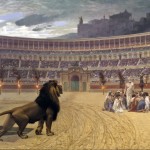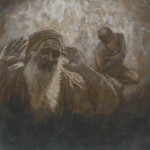 In her cover essay for the New Republic, Elizabeth Stoker Bruenig reminds us that, in the traditional social doctrine of the church, the universal destination of goods comes before the right to private property. The former, not the latter, is primordial:
In her cover essay for the New Republic, Elizabeth Stoker Bruenig reminds us that, in the traditional social doctrine of the church, the universal destination of goods comes before the right to private property. The former, not the latter, is primordial:
Since the early centuries of the Church, prominent theologians such as Ambrose, Augustine, and Saint John Chrysostom have emphasized that private property rights obtain only after all human needs have been met, and that the excess of the wealthy truly belongs to the poor.
St. Ambrose, for example, taught that “nature has poured out all things for the common use of all, for God caused all things to be produced in such a way that there might be food common to all, and that the earth might serve as a kind of common possession for all.” John Chrysostom wrote just as forcefully: “not to enable the poor to share in our goods is to steal from them and deprive them of life. The goods we possess are not ours, but theirs.” In more recent memory, Pope Paul VI reiterated the doctrine: “the demands of justice must be satisfied first of all; that which is already due in justice is not to be offered as a gift of charity.”
What does this doctrine mean for private property rights? Allow me an illustration. Suppose a group of settlers discovers an unoccupied valley. The land is fertile and proves fruitful enough to meet all of the settlers’ needs. The wealthier settlers are the first to arrive. They divide up the land among themselves and begin to cultivate it. A system of government is devised and instituted. A legal currency is established. Laws pertaining to property, contracts, trade and so forth are written and enforced.
During this time the poorer settlers arrive and set up residence in the remote regions of the valley–areas that are much less fertile, if not entirely barren. Most of these later arrivals lack the resources to meet their basic needs, let alone live comfortably. Despite their hard work, they’re underfed and live in dwellings that provide poor protection from the elements. Most of these end up seeking employment in the businesses of the rich, improving their lot a little, but still insufficiently. The poorer residents of the valley begin to make demands, insisting on a more equitable and fair distribution of goods.
The poor claim that, as human persons, they’re entitled to the basic necessities of life and a degree of comfort. The rich respond that they’re under no moral or legal requirement to recognize this entitlement. They got to the valley first and worked the land, procuring its fruits with their minds and bodies; therefore, their portions rightfully belong to them. Justice requires no redistribution. After all, many of the poor wouldn’t have jobs if it weren’t for the them. Some of the rich, however, offer the poor charity. This kindness helps, somewhat, but it isn’t sufficient to lift the poor out of their poverty. The distribution of goods, settled and enforced by the valley’s property laws, favors the wealthy. Their entitlement claims have the force of law; the entitlement claims the poor make based on their human dignity do not have such support.
From a Christian standpoint, a Catholic one especially, this valley’s political-economic system is fundamentally unjust. By design and in practice, it excludes the poor from the goods of the valley. It steals from them and deprives them of life. The gospel makes no distinction between the deserving and the undeserving poor: people are due food, water, clothing, shelter, education, health care, meaningful work and the like simply because they are human.
To be sure, as Tom Zampino noted the other day, the church also recognizes private property rights. In the words of Pope Leo XIII:
[P]rivate ownership is in accordance with the law of nature. Truly, that which is required for the preservation of life, and for life’s well-being, is produced in great abundance from the soil, but not until man has brought it into cultivation and expended upon it his solicitude and skill. Now, when man thus turns the activity of his mind and the strength of his body toward procuring the fruits of nature, by such act he makes his own that portion of nature’s field which he cultivates – that portion on which he leaves, as it were, the impress of his personality; and it cannot but be just that he should possess that portion as his very own, and have a right to hold it without any one being justified in violating that right.
You’ll notice that this is the argument the wealthy settlers made in my illustration. Are they right, then? No. Their fault is not in claiming ownership per se, but in putting their ownership of the land before and above the needs of their fellow settlers. They used the advantages of their wealth to secure the most fertile areas for themselves, physically and politically. Yes, they cultivated the land, putting themselves into it and making it their own, but they did so as if the land did not first and foremost belong to all those who lived in the valley. They fashioned a government to support entitlements based on private ownership, but not entitlements based on universal human dignity. The valley’s political-economic system therefore works to the advantage of the affluent over and against the interests of the poor.
The valley’s rich have some claim to private ownership of the land, but so do its impoverished. The rich claimed and enforced their private ownership prematurely, more so as the hardship of the poor is, to a large degree, a direct result of their decisions and actions, individual and collective. Now they protest that the poor are trying to use the government to force a redistribution of wealth, ignoring the fact that they use government force against the poor and that the original distribution of goods in the valley was a result of their power and their decisions. To be brought into compliance with the gospel and its preferential option for the poor, the valley’s economy would need to be radically redesigned, not to do away with private property rights and their legal enforcement, but to make the universal destination of goods primordial and to give it the force of law.
The same goes for ours.
Social programs to help the poor shouldn’t be an afterthought, but a principle purpose of government. Promoting the general welfare should mean seeing to it that all human needs are being satisfied, and where they are not, using the force of law to help satisfy them. This use of force is not a violation of private property rights, not according to Catholic social doctrine. One can’t justly hide behind private property rights when the system that defines and supports those rights oppresses or ignores the less fortunate, enforcing grossly unequal distribution and neglecting basic human needs.











